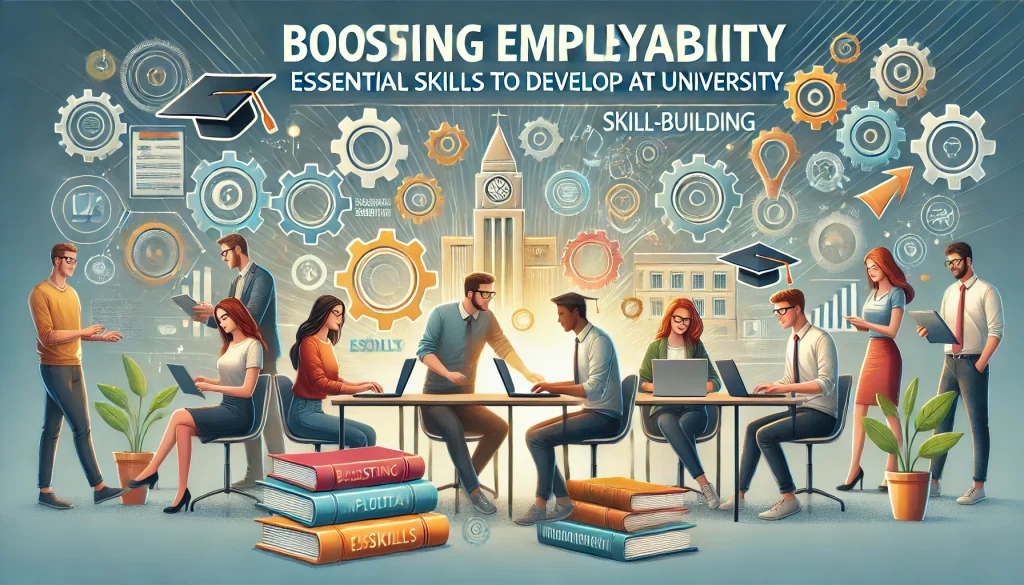How to Boost Your Employability While in University: Essential Skills and Strategies

In an increasingly competitive job market, university students are expected not only to excel academically but also to develop a set of valuable skills that can distinguish them as strong candidates. Universities offer more than just degrees; they’re a resource-rich environment where you can acquire, refine, and master key employability skills. Here’s a guide to making the most of your university experience to ensure career readiness.
1. Leverage Internships and Work Placements
Internships are one of the most impactful ways to gain real-world experience. Many universities have connections with local companies and offer internship programs that can lead to job opportunities. During these placements, students gain industry-specific insights and can build a portfolio of work that speaks to their capabilities.
- Take Action: Start looking for internships early in your course. Many competitive programs have application deadlines months in advance. Check with your university’s career services for guidance on where to apply.
- Benefits: Internships provide a network of contacts, enhance your resume, and give firsthand experience in a professional setting.
2. Hone Communication Skills Across All Mediums
Communication is key in virtually every job. Being able to clearly convey ideas, understand others, and effectively collaborate are qualities highly sought after by employers. University life provides endless opportunities to refine these skills, from giving presentations in class to working in study groups and participating in student organizations.
- Take Action: Take on roles that require public speaking, practice writing with clarity in assignments, and engage in group discussions.
- Benefits: Enhanced communication helps you work effectively in team environments, articulate ideas persuasively, and show confidence in job interviews.
3. Cultivate Leadership through Campus Involvement
University clubs, societies, and sports teams provide a perfect platform for developing leadership skills. When you lead a team, organize events, or oversee club activities, you practice decision-making, strategic planning, and conflict resolution. These experiences showcase your ability to take initiative—an essential quality for leadership roles in any career.
- Take Action: Volunteer for leadership positions in clubs or sports teams. Even if you’re new, joining a team and being active can lead to leadership opportunities.
- Benefits: Leadership experience demonstrates responsibility, teamwork, and the ability to manage and motivate others effectively.
4. Master Time Management and Organizational Skills
Balancing academic assignments, extracurricular activities, and perhaps a part-time job is no small feat. Through this process, students learn to prioritize tasks, set goals, and manage time effectively—crucial skills for any profession.
- Take Action: Use tools like planners, calendars, or productivity apps to track deadlines and plan tasks. Create a balanced routine that dedicates time for study, activities, and self-care.
- Benefits: Strong organizational skills enhance productivity and ensure you can manage workloads efficiently, a vital trait in fast-paced work environments.
5. Build Technical and Digital Proficiency
Digital skills are non-negotiable in today’s tech-driven job market. Many roles require familiarity with industry-standard software, from Microsoft Office Suite to specific tools for data analysis, graphic design, or programming. Courses, workshops, and online resources can all help you develop relevant technical skills that align with your career goals.
- Take Action: Identify the digital tools and technologies commonly used in your field. Seek courses or workshops, many of which are offered by universities, to build a solid foundation in these tools.
- Benefits: Digital proficiency gives you an edge in nearly all industries, showing adaptability and a readiness to take on modern work challenges.
6. Take Advantage of University Career Services
Career services departments are dedicated to helping students prepare for their post-university careers. Many offer resume reviews, career counseling, mock interviews, and job placement assistance. Some even host networking events and workshops featuring industry professionals.
- Take Action: Schedule an appointment with a career counselor early in your academic journey. Attend workshops on resume building, job searching, and interviewing skills.
- Benefits: Professional guidance enhances your job search approach, helping you refine your application materials and build confidence for the hiring process.
7. Build a Professional Network through University Resources
Networking is a valuable way to make connections that can lead to career opportunities. Universities often organize career fairs, alumni events, and guest lectures where you can meet professionals in your field. Additionally, your professors and peers can also serve as a vital part of your professional network.
- Take Action: Attend networking events, follow up with guest speakers, and consider joining LinkedIn to connect with industry professionals. Build genuine relationships with professors and alumni who may offer career guidance or job referrals.
- Benefits: A strong professional network can provide mentorship, job referrals, and industry insights, which can make a significant impact on your career path.
Conclusion: Make University Count for Career Success
University is a transformative period, not only for academic growth but also for building skills that make you a desirable candidate in the workforce. By taking proactive steps to develop these employability skills—whether through internships, technical training, or campus involvement—you position yourself to transition smoothly into your career. Don’t let these opportunities pass by; leverage every resource your university offers to stand out as a well-rounded, skilled professional.
For more insights on how to build employability skills, check out TopUniversities’ guide.




